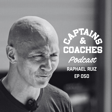
046 - Delayed Gratification & Team Building w/ Derek Woodske
Derek Woodske challenges everything you think you know about athletic success. While the sports world obsesses over superstars, Derek reveals why championships are actually built by the "glue guys" - the unsung heroes who hold teams together when everything falls apart.
Drawing from his experience coaching across multiple sports and levels, Derek shares the raw psychology behind delayed gratification in sports, the moment when athletes realize their careers are over, and how great coaches help players find their true purpose within the team dynamic.
This isn't motivational fluff - it's honest, psychological insight into what actually makes teams work. Whether you're a coach, athlete, or simply fascinated by human performance, Derek's philosophy will challenge how you think about success, failure, and finding your role in any competitive environment.
Old Bull Training Program - 7 Day Free Trial: https://bit.ly/old-bull-train
#SportsCoaching #TeamBuilding #SportsLeadership #AthleteMindset #PerformancePsychology #SportsMotivation #TeamCulture #CoachingPhilosophy #AthleticDevelopment #SportsSuccess #delayedgratification #sorinex #summerstrong #glueguy



















